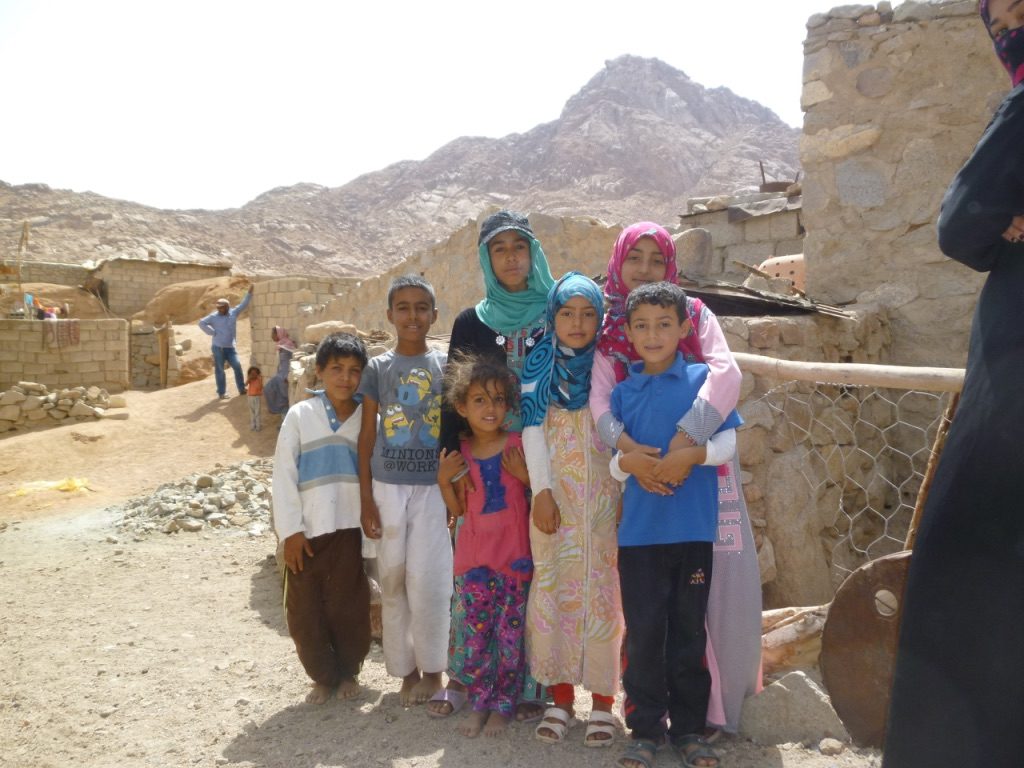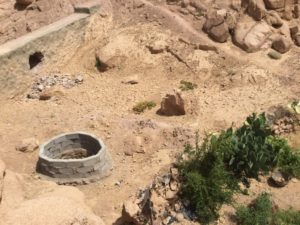Life in Sinai
While the current state of affairs seems much the same on the surface, every trip shows life is just a bit more difficult for the Bedouin people. Apart from the weather being very hot and making ordinary activity hard, it is a temporary problem unlike the rampant inflation which continues to make life tougher for everyone. Basic foods and necessities have risen in price by up to 600% and cooking gas by a staggering 1200% . For an already impoverished community with next to no work, this is very distressing and depressing. However we had a very nice message from senior Bedouin, delivered by Sheikh Ahmed. He said that the people were telling him that the only organisation that has really helped the community over the last 15 years is The Makhad Trust. Our wells project is bringing water and hope to many people who would otherwise not have help. Water is life, he reminded us. He asked me to pass on their very grateful thanks to all our sponsors and supporters.
The Makhad Trust hasn’t brought the big money that an EU project does, but the funds we do bring, help the people directly with no middle men involved. We follow up the projects and ensure that they are working properly and have an ongoing consistent presence in the community. In short, we can be relied upon. The money that is given to the well owners, or to the beekeeping course, or to the Herb Growing Course (more later), will stay in the community, being spent several times over, paying well diggers, who then buy food from the supermarkets, or camel men who then buy camel fodder, or fuel for generators. Mahmoud says that everyone looks forward to the date of the next visit by the Project Manager, because they know that there will be more money around. In an ideal world, somehow more jobs would materialise, bringing prosperity to the area again. It doesn’t look as if tourism is going to provide this economic boost as numbers are still very small and few of the visitors to the monastery want to go trekking in the mountains like people used to do. The Bedouin would love to see more tourists and work with them.
The Wells Project
As a result rising commodity prices, the builders, diggers and suppliers have also had to put up their prices. Now we have to consider increasing the amounts paid out for well restorations, so that the restorations are still feasible for the Bedouin. At present each well owner contributes between 2000 to 7000LE of their own money, depending on what the well needs. More people are growing vegetables now and more are coming forward to ask for their names to be added to our waiting list. As a result the waiting list keeps getting longer despite us restoring nearly 50 wells this year.
During this trip we brought sponsorship for the restoration of 11 more wells, and made site visits to over 20 more wells which are underway. We are aiming to restore 50 wells this year and have started 32 so far. With two more visits this year, we need to start 9 more each time. It would be wonderful if we could exceed our target.
Here are some well stories:
Not every well restoration goes according to plan. Hareib had problems from early on.
He has a small well that was nearly dry, providing drinking water for 8 families inthe vill
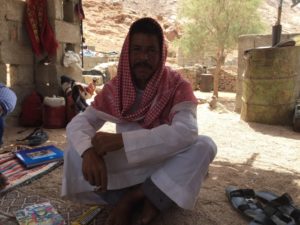 age of Abu Sila. Hareib has worked as a guide in the past but there is no work for him now. He is the brother of Mahmoud Monsur and Nassr Monsur, both well known by visitors to the area. We started his well in July of last year but he was not able to start work straight away as his 16 year old son was involved in a serious motorcycle accident and was hospitalised in Sharm El Sheikh. By the time we visited next, in November, his son was better but the government had come and built one of their many dams across the wadi, so that the well now stood in the bottom of a dry lake. The next flood would be sure to fill the well with gravel and rocks. The plan was for Hareib to continue working on the well, and build a flood protection wall about 2 feet (80cm) high to keep out flood water, and to make a hole in the dam to let out excess water. It was not too difficult to make the hole as the dams are not built very robustly. The dam will be slowing the water and this will bring silt into the area by the well which is ideal for growing vegetables, so he has made a small garden there. On our visit in July we found the well was finally finished and the small garden already looking established. Now Hareib plans to extend the garden and grow lots of food for his family and neighbours.
age of Abu Sila. Hareib has worked as a guide in the past but there is no work for him now. He is the brother of Mahmoud Monsur and Nassr Monsur, both well known by visitors to the area. We started his well in July of last year but he was not able to start work straight away as his 16 year old son was involved in a serious motorcycle accident and was hospitalised in Sharm El Sheikh. By the time we visited next, in November, his son was better but the government had come and built one of their many dams across the wadi, so that the well now stood in the bottom of a dry lake. The next flood would be sure to fill the well with gravel and rocks. The plan was for Hareib to continue working on the well, and build a flood protection wall about 2 feet (80cm) high to keep out flood water, and to make a hole in the dam to let out excess water. It was not too difficult to make the hole as the dams are not built very robustly. The dam will be slowing the water and this will bring silt into the area by the well which is ideal for growing vegetables, so he has made a small garden there. On our visit in July we found the well was finally finished and the small garden already looking established. Now Hareib plans to extend the garden and grow lots of food for his family and neighbours.
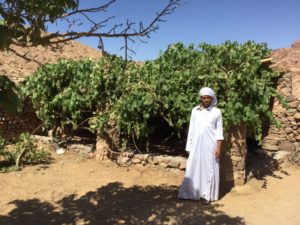 Mohamed Mansur Awad has a well in the high mountains in Wadi Buleia. Many people have stayed in his garden while trekking in the mountains and his work has been as a mountain guide. We had often passed his garden while walking in the mountains and it had been sad to see so many of the trees dying. Just the long rooted pomegranates seemed to be surviving. We started Mohamed’s well in May and found that the work was all complete on this trip. He had not only dug the well deeper so that he had 2 m of water now, but he had repaired the areesha, planted grape vines and watered all the existing trees. He has lots more small trees in pots at home, waiting for the winter time to plant them in his garden. It was already transformed when we saw it last week but will look forward to seeing it bloom over the next year or two. He will be bringing his wife and children to stay in the garden all summer.
Mohamed Mansur Awad has a well in the high mountains in Wadi Buleia. Many people have stayed in his garden while trekking in the mountains and his work has been as a mountain guide. We had often passed his garden while walking in the mountains and it had been sad to see so many of the trees dying. Just the long rooted pomegranates seemed to be surviving. We started Mohamed’s well in May and found that the work was all complete on this trip. He had not only dug the well deeper so that he had 2 m of water now, but he had repaired the areesha, planted grape vines and watered all the existing trees. He has lots more small trees in pots at home, waiting for the winter time to plant them in his garden. It was already transformed when we saw it last week but will look forward to seeing it bloom over the next year or two. He will be bringing his wife and children to stay in the garden all summer.
Hamid lives in Eggreyradt and we first visited this community in October 2015. It is 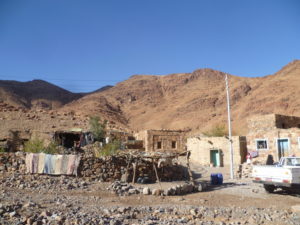 situated far round the back and most southern part of Mt Sinai, about one and a quarter hours drive from St Katherine’s. We found a very remote community with hardly any water in a dried up but very beautiful valley.The track to Eggrayradt is steep and tortuous and difficult for any vehicles to tackle except jeeps, and very few people have them. Because it is so remote, with not enough water for growing in their gardens, the people could only buy vegetables once every three to four weeks. One of the elder ladies told us of how she would walk for 7 km with her donkey to the nearest well to get 60 ltrs of water and then walk back and do this every 3 days. Many of the families spent months at a time away from the community, with their children in schools in the next valley but where there is also access to water and food. In fact the community was dying, even though the people loved it there and would have liked to live at Eggreyradt all the time.
situated far round the back and most southern part of Mt Sinai, about one and a quarter hours drive from St Katherine’s. We found a very remote community with hardly any water in a dried up but very beautiful valley.The track to Eggrayradt is steep and tortuous and difficult for any vehicles to tackle except jeeps, and very few people have them. Because it is so remote, with not enough water for growing in their gardens, the people could only buy vegetables once every three to four weeks. One of the elder ladies told us of how she would walk for 7 km with her donkey to the nearest well to get 60 ltrs of water and then walk back and do this every 3 days. Many of the families spent months at a time away from the community, with their children in schools in the next valley but where there is also access to water and food. In fact the community was dying, even though the people loved it there and would have liked to live at Eggreyradt all the time.
This was all before we were able to sponsor the first well here started in July 16 and finished in November 2016. Since the help from the Makhad Trust, with 3 wells restored, there is now enough water for everyone to drink, for all the goats and camels too, plus there is enough to grow vegetables in two of the old gardens. They have been putting waste water on the old trees by their houses and these are green again. Now the families who had moved away are coming back more often, at weekends and holidays, and all the summer. What was becoming a ghost community with only the elderly people left is now thriving with 15 large families. But it is not just a group of families, it is a strong community of people who want to live here and who now can.
Herbal Horticulture Course for Fatherless Children
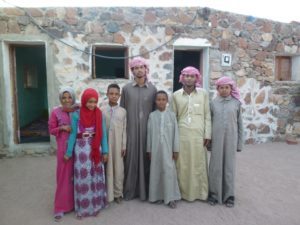
We called this the Orphan Herb Course last year but the title wasn’t really accurate. While there may be some children who have had the misfortune to loose both parents, it is quite rare, whereas there are lots of children who have lost their father. Life is difficult for these children as there is little money coming into the family and there is a feeling that their loss and grief puts them outside the community. This course is an attempt to address this problem by teaching these children how to grow and sell herbs the traditional way, making them belong to a special group too. The new teacher, Slim, has come up with a very good plan to make this work, based on the results of the prototype we funded last year. He has put forward 10 students, 3 of whom are 18+ years old, and who will act as team leaders. He will put the students into 3 teams, each with an older team leader, and they will work together on their team’s garden. The course will run for 3 months into the Autumn and then resume in the spring for 3 months which will take them through a full year of herb growing. He plans to teach them about their environment, ecology, geography and traditions as well as about the herbs themselves, in order to put the course in a Bedouin context. He will be giving them notebooks and pencils to keep records of their study. The course will cover many areas of their present educational syllabus but in a practical way. At least two of the students had been on Atia’s course last year and are very interested in learning properly this time. The students come from Esbaia and Wadi Raha. Slim plans to take them into the mountains to see the herbs growing in their natural habitats. The photo shows 7 of the children from Wadi Esbaia who came to meet us.
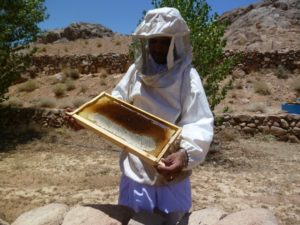 Beekeeping Training Course
Beekeeping Training Course
We met with Salem, the Beekeeping teacher in his garden in Wadi Buleia, in the mountains. First he updated us with what has been happening with the students on this, the second beekeeping course. He said that he is happy with the way that the students are getting on with their bees, the bees are well and producing honey. They have not yet harvested the honey and expect to do so in the forthcoming weeks. They will make another harvest in mid autumn. We will visit all the beekeepers and their gardens during the next visit in September.
We then talked about the possibilities of running another course next Autumn. Salem was happy to do this. Thanks to significant funding from the Eva Crane Trust and to the Didymus Trust we can support this project again for the forthcoming year (September 2017 to September 2018) and with an increased number of students. By training 10 students, all of whom have gardens in far away wadi’s, the bee pollinating population will be spread wide over the area.
Library
The library is ever more popular, largely due to the enthusiasm of another of our 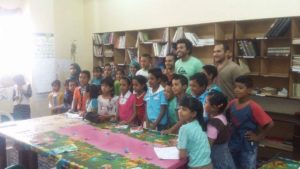 supporters, Mahmoud Abed. He was an Astrology graduate in Cairo but wanted to live in St Katherine’s and now helps with the library. Mahmoud has been running activities in the library for 2 months now, since school finished. On Mondays they have a film, usually an informative documentary, shown on the projector and screen that his friends had donated. On Wednesdays he runs workshops including recycling rubbish into art and useful things. One day they made muppet puppets out of old socks and the children loved this.
supporters, Mahmoud Abed. He was an Astrology graduate in Cairo but wanted to live in St Katherine’s and now helps with the library. Mahmoud has been running activities in the library for 2 months now, since school finished. On Mondays they have a film, usually an informative documentary, shown on the projector and screen that his friends had donated. On Wednesdays he runs workshops including recycling rubbish into art and useful things. One day they made muppet puppets out of old socks and the children loved this.
There is now a new lady running the library, called Zainab, as Farhana is pregnant and will have her baby in about 3 months. Now that it is summer, we hope many more children will be spending their large amount of spare time in the cool of the library.
A few days ago, the children had a visit from Omar Samra the son of one of our trustees and a world class mountaineer. Omar was the first Egyptian to summit Mt Everest and has completed the explorers grand slam of climbing the highest mountain on every continent plus skiing to the North and South Poles. He is a great role model for the children.
Bottle Gardens and Horticulture.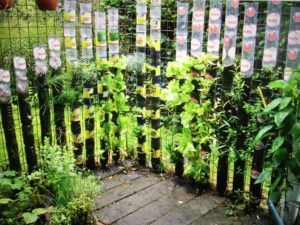
We have been trying a low key approach to getting more people to grow food by encouraging everyone make more of their gardens or to make new gardens. As food prices rise, lots of people already want to do this but need more seeds and to experience different ways of growing. The Horticulture Project is just getting going to support this. Mahmoud Abed has just taken on the challenge of getting people to grow food in their yards by the houses by planting leafy veg in bottles, so that even people without gardens can participate. He is starting by encouraging children to make these gardens and we hope it will get children interested in growing things. It should be possible for people to eat well on a much reduced budget and to be healthier. The photo shows how we hope the bottle gardens will look.
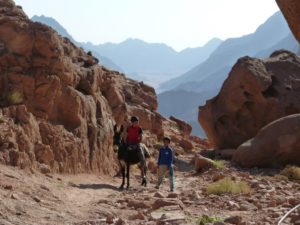 Encounter with small children
Encounter with small children
While Mahmoud and I were puffing up Abu Giffa pass in 35 degree heat at 7 am one morning, we heard children’s voices. We stopped for a rest in the shade just before the top of the pass when along came two children and a donkey. They were Mohamed who is 7 and his brother Abdul who is 5 years old. They didn’t have any parents or adults with them and were going to visit their garden in wadi Shaq where their family stay in summer, about a 4 mile walk from home in the town. Mohamed, the elder brother was riding the donkey but its blanket saddle had slipped so he got off. Abdul, who, to remind you, is only 5, adjusted the blanket and then started to tie it up with some good rope. He had to pull hard to get the girth right and do some good 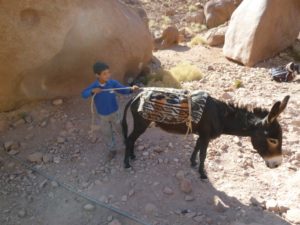 knots to keep it there. He had no problem with this at all and would have put some adults to shame. It made me think of how my 5 year old son refused to learn how to tie bows and knots and never actually had laces until he wore climbing shoes as a teenager. I don’t think he was unusual. Seeing Mohamed and Abdul reminded me how different life in Egypt and UK are. In Egypt, children are encouraged to take an active part in family life, doing some of the same work as their parents, and they are given a lot of freedom in the world at large. I am sure they were both quite safe. Everyone here knows almost everyone else and would look out for other peoples children when needed, there is a very strong community.
knots to keep it there. He had no problem with this at all and would have put some adults to shame. It made me think of how my 5 year old son refused to learn how to tie bows and knots and never actually had laces until he wore climbing shoes as a teenager. I don’t think he was unusual. Seeing Mohamed and Abdul reminded me how different life in Egypt and UK are. In Egypt, children are encouraged to take an active part in family life, doing some of the same work as their parents, and they are given a lot of freedom in the world at large. I am sure they were both quite safe. Everyone here knows almost everyone else and would look out for other peoples children when needed, there is a very strong community.
Journeys to Sinai
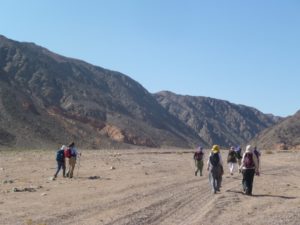 Makhad Trust Supporters and Trekkers are always very welcome in Sinai. We expect to be running a dam building journey in the high mountains next Spring and will be looking for participants.
Makhad Trust Supporters and Trekkers are always very welcome in Sinai. We expect to be running a dam building journey in the high mountains next Spring and will be looking for participants.
You could also join a hike on the Sinai Trail (a separate organisation – www.sinaitrail.org) at any time. This is a 200km trek from the Gulf of Aquaba to the top of Mount St Katherine’s. Visitors create much needed jobs and bring income to the impoverished Bedouin. More news of the Dam Journey in the next newsletter.
Helen’s next journey to Sinai will be from 15 September to 5 October, with the next newsletter following closely after.
You can get in touch by emailing helencranston@makhad.org or by using the contact details below. We would love to hear from you.
Makhad Trust Wolseley House Cheltenham Gloucestershire GL50 1TH England
T +44 (0)1242 544546 F +44 (0)1242 544565 E enquiries@makhad.org W www.makhad.org
The Makhad Trust Registered UK Charity No. 1100377 Registered Company No. 4583140




